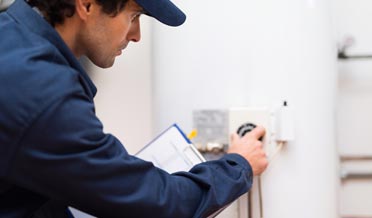Water Heater Installation: Choosing the Best Option for Your Home
Water heaters have added a tremendous amount of comfort to homes in the U.S. Hot water for bathing and cleaning has become an essential part of our days and not just during cold weather months. Imagine cold showers or needing to heat water on a range top for washing dishes or clothes.
The longevity of water heaters ranges between 10 and 20 years, with many variables that impact this range. The mineral content in water is the largest variable since minerals settle out of the stationary water and are deposited at the bottom of the tank. The longevity of service may depend upon proper maintenance.
Consult with your plumbing contractor about regularly flushing the sediment from the bottom of your water heater. The buildup of sediment can diminish efficiency and reduce the useful years of service. When the time comes for replacement, you will have several interesting Water Heater Installation choices to make.
Storage and Tankless Water Heater Installation
Storage-type water heaters were developed in the 1890s, while tankless water heaters were developed in the 1920s. Even though both systems have been around for decades, storage water heaters have gained the lion’s share of the market for residential construction.
- A storage tank water heater includes an upright tank of varying storage capacity, often found in a utility closet, garage, or basement. A large amount of water is heated and held in an insulated tank, waiting for the call for hot water.The water is kept hot 24/7, ready at a moment’s notice. After the faucet opens, the first few seconds of water will not be hot, as the cold water empties from the water line. This is a rather inefficient method of keeping hot water ready.
- A tankless water heater utilizes much smaller tanks, located where the need for hot water exists. These tanks hold only 2 to 5 gallons. The heat source can heat the water VERY quickly, giving a seemingly endless supply of hot water with no wait time. This is a more efficient method of providing hot water as needed.
The cost comparison between the two systems is interesting.
- Storage tank water heaters have a lower initial cost, but since they must keep lots of water hot 24/7, they cost more to operate.
- Tankless systems are more expensive to install since multiple small tanks are installed throughout the home. However, they only keep a small amount of water hot and heat water as needed.
- Replacing an existing storage water heater with another storage water heater is the most cost-effective choice.
- Bringing a heat source (electricity or natural gas) to several locations and mounting small tanks can be quite expensive, which means retrofitting an existing home with a tankless system might not make economic sense. A better option is to install a tankless system in new construction or during a remodel.
The most common sources are electricity and natural gas. Both are good options; natural gas is slightly more efficient than electricity, but gas is not available for every location. Both storage and tankless systems are available in both heating sources, but bringing natural gas to several locations inside a finished home might not be an option.
Another important water heater option is size. Most tankless systems have a uniform size tank since they fit in rather small spaces (vanity or kitchen cabinets). Storage tanks vary in size, depending upon the number of occupants in the home.
- For homes with 4 occupants, a 40-to-50-gallon tank is considered adequate.
- For homes with 5 occupants, a 50-gallon tank is considered adequate.
- For homes with more than 5 occupants, a 60-gallon tank is needed.
Need help with Water Heater Installation? We can help!
Let Doctor Cool help with your Water Heater Installation and Residential Plumber Repair questions. Call Doctor Cool & Professor Heat today at 281-338-8751 or email Doctor Cool and let our professional Residential Plumber Contractors assist with all of your Water Heater Installation questions.

